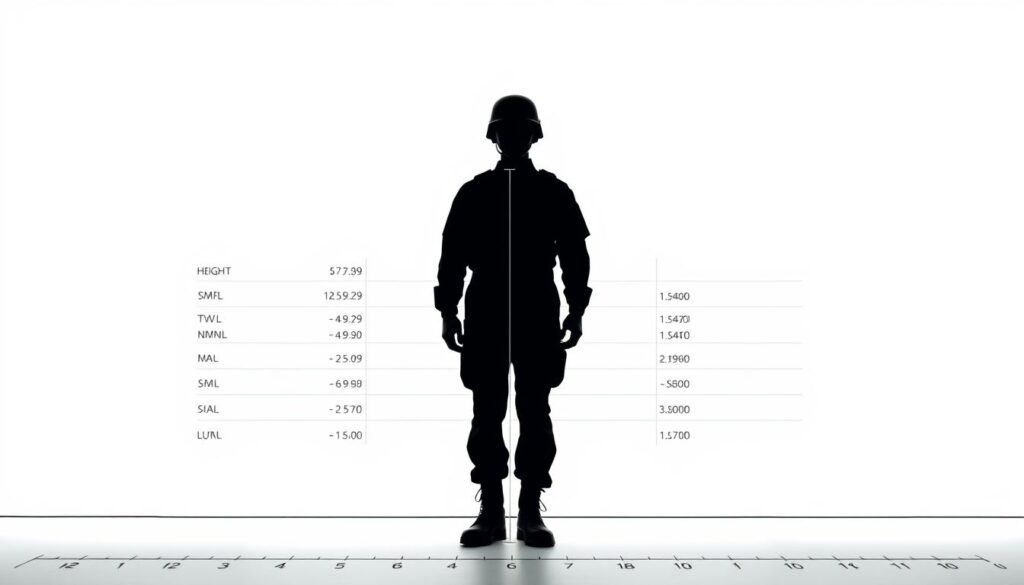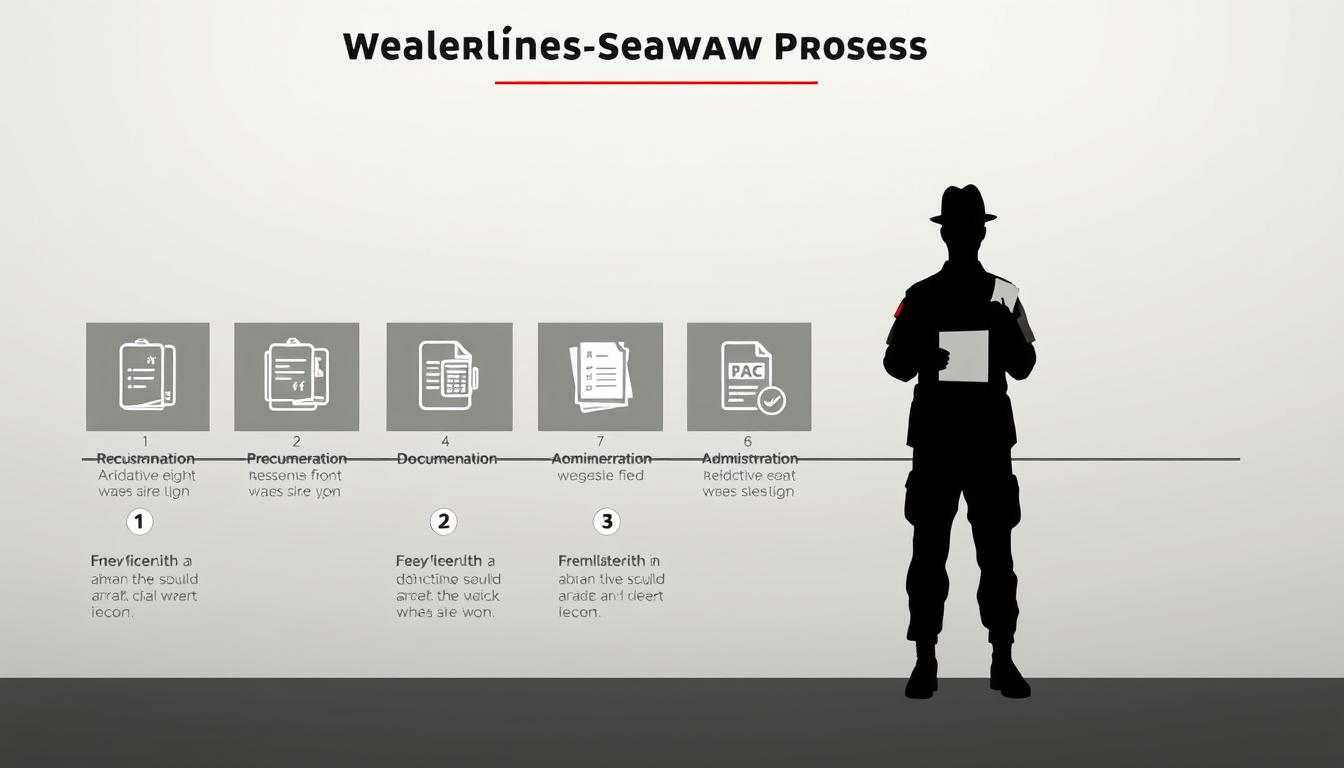Can you still join the Army if you don’t meet the standard height and weight requirements? Yes, you can, but it depends on several factors. The Army has a waiver process for those who don’t meet the physical standards.
The U.S. Army’s requirements say failing to meet height and weight standards might disqualify you. But, a waiver can be granted in some cases. This allows individuals to enlist even if they don’t meet the physical requirements.
Key Takeaways
- The Army has a waiver process for potential recruits who don’t meet the height and weight requirements.
- Waivers are granted on a case-by-case basis.
- The Future Soldier Preparatory Course is a 90-day program to help meet the required body fat composition.
- Height and weight restrictions vary by age and gender.
- Individuals who don’t meet the physical requirements at MEPS may be eligible for the Future Soldier Preparatory Course.
Understanding Army Height and Weight Standards
Knowing the Army’s height and weight standards is key for those wanting to join. The Army has strict rules for height and weight. Meeting these height and weight requirements is a must for enlistment.
The Army’s standards ensure recruits can do their jobs well. These rules change based on age and gender, as shown in the Army’s charts.

Importance of Meeting Standards
Passing the Army’s height and weight standards is more than just an initial test. It’s about staying fit throughout your service. Those who don’t meet these standards might face extra checks or needs.
Following these standards is very important. It shows a recruit can handle the physical demands of military life.
Overview of Army Regulations
The Army has clear rules for height and weight, shown in specific charts. For example, men and women’s height ranges from 60 to 80 inches, and 58 to 80 inches, respectively.
The Army says “Height and weight restrictions vary by age and gender.” This means the max weight limits change with age and gender, as shown in the Army’s charts.
Knowing these rules is crucial for a smooth enlistment process. By learning about the Army’s weight standards, potential recruits can get ready for what’s ahead.
Eligibility for Waivers
To join the Army, you must meet certain height and weight standards. Waivers can be given in some cases. This lets people show they can still serve, even if they don’t meet the usual requirements.
Criteria for Requesting a Waiver
The Army looks at waiver requests for those who are too heavy or don’t meet height standards. To qualify, you must pass the Assessment of Recruit Motivation and Strength (ARMS) test. This includes a stepping test and push-ups.
The ARMS test checks your physical fitness and motivation. Passing it shows you can do well, even if you don’t meet the usual height and weight standards.
Who Can Apply for a Waiver
Not everyone can get a waiver. The Army reviews each request carefully. They look at your health, fitness, and motivation.
| Category | Eligibility Criteria |
|---|---|
| Height | Individuals who do not meet the minimum or maximum height requirements |
| Weight | Individuals who exceed the maximum weight limit for their height and age group |
| Physical Fitness | Candidates who pass the ARMS test, demonstrating their physical fitness and motivation |
Knowing the rules and waiver process helps you understand what it takes to join the Army.
The Waiver Application Process
The Army has a waiver process for those who don’t meet height and weight standards. It lets people join if they show they’re working to meet these standards. This is based on Army regulations.

Documentation Required
To start the waiver process, recruits need to gather certain documents. They must provide medical records that explain any health issues. They also need proof of efforts to comply with the Army’s fitness program.
For more on the Army’s height and weight calculator, visit this resource. It helps understand how height and weight are evaluated.
Steps to Submit a Waiver Request
Here are the steps to submit a waiver request:
- Fill out the application forms correctly and fully.
- Include all needed documents, like medical records and proof of fitness efforts.
- Send the application through the right channels, possibly to a commanding officer or Army department.
The Army’s waiver process is to let people show they can meet Army standards.
Timeline for Processing
The time it takes to process a waiver request varies. It depends on the case’s complexity and how fast the documents are provided. Usually, a decision is made in a few weeks to months.
“The Army’s waiver process is designed to be fair and thorough, ensuring that all candidates are given a chance to prove their eligibility.”
Applicants should keep track of their application’s status. They might need to provide more information as needed.
Evaluating Waiver Requests
The Army looks at many things when they review waiver requests. They check if someone can really serve in the Army.
Factors Considered by the Army
The Army checks a few key things when they look at waiver requests. They look at the person’s motivation, physical fitness, and health. These are important to see if someone can meet the Army height and weight requirements and Army weight standards.
A senior military official said, “The Army wants to make sure Soldiers are healthy and can do their jobs well.” This is why they carefully check waiver requests.
“The waiver process is not just about meeting the minimum standards; it’s about ensuring that our Soldiers are capable of performing their duties effectively.”
Common Reasons for Approval
Waivers are often approved if someone shows they can meet the standards with hard work and training. The Army wants to see demonstrated commitment and a plan to follow Army height and weight standards.
Here are some reasons why waivers are approved:
- Demonstrated physical fitness beyond the minimum requirements
- A clear plan for achieving and maintaining compliance with Army standards
- Evidence of strong motivation and dedication to service
Maintaining Compliance Post-Waiver
After getting a waiver, Soldiers must still meet the Army’s height and weight standards. The Army Body Composition Program offers resources to help them stay healthy.
Regular Monitoring
Soldiers need to have regular height and weight checks. This is to make sure they follow Army rules. They do monthly self-checks to track their progress, as the Army Regulation 600-9 says.
Physical Fitness Programs
The Army’s fitness programs are key to staying fit. Soldiers who don’t meet body-fat standards join these programs. They get help from a master fitness trainer and a dietitian or health provider, as the Army’s guidelines suggest. This helps them stay ready and follow the army’s rules.


